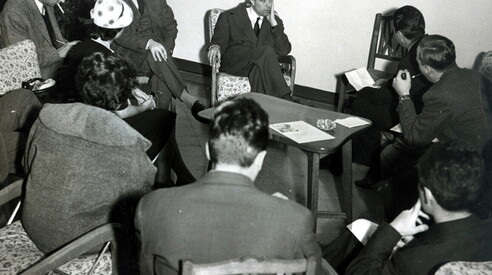The rediscovery of Albert Camus, more relevant than ever in these uncertain times


Photo LaPresse
the book
With Actuelles IV, Gallimard continues the collection of the political writings of the French-Algerian Nobel Prize winner. A lucid and passionate portrait of an intellectual who made justice the heart of his existential ethics
Books about Albert Camus continue to proliferate in France: collections of articles, essays on the most varied topics, literary correspondence and unpublished documents increasingly reinvigorate the figure of the Franco-Algerian writer, sometimes downgraded by certain critics for his ambiguous positions on Algerian decolonization.
The new volume Actuelles IV, recently published by Gallimard , a publishing house that continues the work of cataloguing Camus' political writings already begun with volumes I, II and III, collects some unpublished texts and retraces the intellectual and committed work of the 1957 Nobel Prize winner for Literature, offering a sort of pot pourri of his most famous interventions.
Through the cataloguing of Catherine Camus and some employees of the “Camus fund” located at the Méjanes library in Aix-en-Provence, the volume provides an organic path of positions and correspondence with various European personalities, among whom stand out for example Ignazio Silone and Nicola Chiaromonte, with whom Camus shared the same idea of Europe in opposition to the totalitarianism of the twentieth century. From the subtitle – Face au tragique de l'histoire – we also understand the will of the Franco-Algerian writer to fight the hypocrisies of his time through the search for truth , attempting an intellectual path that will ultimately lead to Homme révolté, a true philosophy of history that will contain the fundamental pivot of the West: the revolt through the so-called “meridian thought”. In fact, Camus is a writer who lets a fervent passion for the destiny of man and the civilization that surrounds him shine through, often however giving in to a little too much moralism and obscure linguistic rhetoric. His friend René Char had no qualms about defining his work as a kind of “entelechy”, a term used abundantly by Aristotle to designate the passage from potentiality to act, the movement of realization of a thing, its being-in-becoming. In Camus, entelechy is part of his ethics of justice, which must be fulfilled within the discovery of one's own person in a posture that could well be defined as “existential”, of full involvement of one's own self . For him, unlike Sartre, essence and existence weave an inseparable bond, impossible to undermine. Not adhering to any system of thought, we could define Camus as an “existential” thinker, and not an “existentialist”, a label he usually avoided in some of his writings (see, for example, the letter to “Mlle Barnes sur l'existentialisme” of 14 October 1959). And even in these political “elzevirs”, collected in Actuelles IV, the defense of the person as a basic principle for the full realization of the community is at the basis of the critical testimony of Albert Camus, a “current” writer of our uncertain time.
More on these topics:
ilmanifesto





